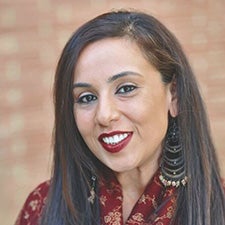In Celebration of the Critical Race Studies Program at 20
UCLA Law Magazine | Fall 2020 | Volume 43
 JASLEEN KOHLI is the director of the Critical Race Studies program at UCLA Law, where she oversees the CRS specialization for more than 200 current students and organizes a robust slate of speaker series, workshops and symposia on issues related to race and the law for members and friends of the broader law school community. Before she joined UCLA Law in 2012, Kohli earned deep experience as an advocate whose work in civil rights, labor law and policy development revolved around integrating Critical Race Theory principles into practice.
JASLEEN KOHLI is the director of the Critical Race Studies program at UCLA Law, where she oversees the CRS specialization for more than 200 current students and organizes a robust slate of speaker series, workshops and symposia on issues related to race and the law for members and friends of the broader law school community. Before she joined UCLA Law in 2012, Kohli earned deep experience as an advocate whose work in civil rights, labor law and policy development revolved around integrating Critical Race Theory principles into practice.
In my role as director of the Critical Race Studies program, I am often asked what makes CRS so special. I struggle with how to adequately respond because CRS is more than just a specialization — although it is the only one of its kind in the country. And it is also more than a series of classes — although you will not find another law school that offers such breadth and depth of racial justice curricula. CRS is more than scholarship — although our scholars are doing some of the most important and cutting-edge work in the field. And it is more than our programs, symposia and workshops — even though we consistently attract some of the most exciting academics, advocates and activists from around the globe to our school.
CRS is an incredibly vibrant and dynamic community. CRS is our students, alumni, faculty, staff and supporters. CRS students enrich us, challenge us and inspire us every day. Our alumni have gone on to clerk for state and federal courts at the trial and appellate levels, to positions with local, state and federal agencies, to solo, mid-size and large-firm practice, and to transform the major civil rights organizations in Los Angeles, across California and the nation. Several have become law professors, and we are especially proud of our former CRS Teaching Fellows, three of whom have now received tenure at law schools around the country.
And 2020 marks the 20th anniversary of this community.
In 2000, law students rallied to protest the fact that, three years after the implementation of Proposition 209, which banned affirmative action in California, only one African American student enrolled at the law school. Their courageous actions included a Records Office sit-in that resulted in the arrests of dozens of students. And they inspired a group of professors to take action, culminating in the law faculty’s vote to establish the nation’s first program of study on race and the law. Twenty years later, the UCLA Law faculty includes five CRS founders – Devon W. Carbado, Kimberlé W. Crenshaw, Cheryl I. Harris, Laura E. Gómez and Jerry Kang – and the program has graduated nearly 1,000 alumni.
We spent much of the early months of 2020 planning an anniversary symposium and celebration. Our symposium, “Rebellious Lawyering: Reverberations from One Chicano’s Radical Vision,” was to honor the work of our own Gerald P. López. Nearly 400 people from around the country and the world were slated to attend, and we looked forward to conversations that would lift our spirits and catalyze solidarity for the fights ahead. It feels appropriate, though, that our plans were cancelled when, as Cheryl Harris wrote in The Nation, “The national narrative of color blindness and racial progress, cultivated over the past several decades, has been ruptured as a result of epic failures in addressing two crises — the Covid-19 pandemic, and the unrelenting carnage of anti-Black violence.”
We have spent much of the last six months reeling from these epic failures and their aftermath. But we in Critical Race Studies are not new to fighting the just fight. Derrick Bell, often considered the founder of critical race theory, published his ground-breaking book Race, Racism, and American Law in 1970. The first page of this seminal critical race theory text includes the iconic photograph of Tommie Smith and John Carlos at the 1968 Olympics. While accepting their medals, they defiantly held up their fists in the Black Power salute. By including this image in the beginning of his book, Bell raised his fist to the legal academy.
More than 50 years later, the Trump administration instructed federal agencies to end racial sensitivity trainings that address topics like white privilege and critical race theory, calling them “divisive, anti-American propaganda.”
In response, we at Critical Race Studies continue raise our fists. As CRS faculty director Laura E. Gómez points out in a recent op-ed for NBC News, “Today our nearly 1,000 alumni work in grassroots social change organizations, for national civil rights organizations … for small and middle-size civil rights practices, for large law firms that engage in critical pro bono work and as legal counsel for state and federal agencies.… Trump already has those who are learned in critical race theory working for federal agencies. And we are all better for it.”